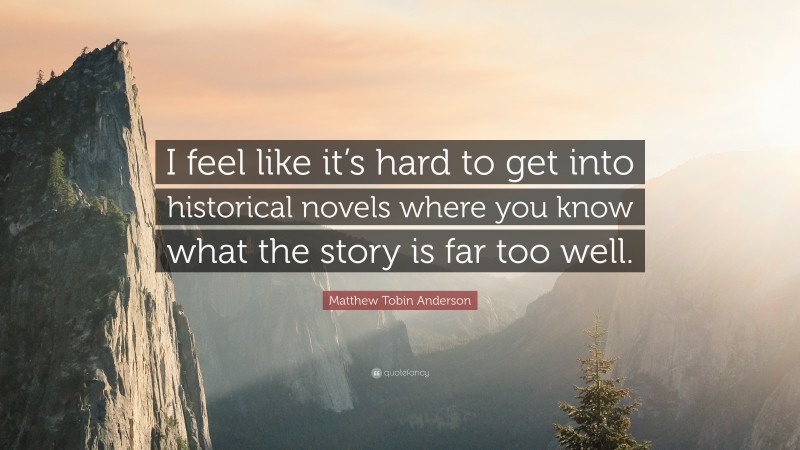

He later went to Cambridge University in England.

He went to Mark’s School in Southborough from where he graduated before moving to Harvard where he remained for a short time before dropping out.


Anderson as his pen name, the writer was born on November 4, 1968, in Cambridge, Massachusetts to an engineer father- Will Anderson and a mother who was an Episcopal priest, Juliana Anderson. Anderson is famous for his different approach to writing which gives a unique world view altogether for readers of different ages.Īlso using M. Anderson of Boston.” The bulk of the story is told in Octavian’s own words, first as “drawn from the Manuscript Testimony of Octavian Gitney” and later “from the nautical diary of Private Octavian Nothing.” Octavian’s accounts of his story are interspersed with newspaper clippings, scientific articles, letters written by various characters, and historical documents-all of which allow Anderson to show different perspectives on events in the narrative.When it comes to children’s book and young adult novels, Matthew Tobin Anderson books are some that would always make the mark. The title page of Anderson’s work declares that the story of Octavian Nothing is “taken from accounts by his own hand and other sundry sources collected by Mr. In these works, the author poses as the reporter of an actual incident, presenting his story in the form of a series of documents, most often letters, diaries, and sworn statements, that he has collected as evidence. Anderson’s solution was to work with a friend who speaks Yoruba to understand “the ways in which African syntactical patterns may have translated into English.… What became obvious is that many of the features that were recorded by white observers actually had their roots in West African American.”Īnderson reinforces the period feel of the book by employing a device often used in novels in the eighteenth and nineteenth centuries, most notably Bram Stoker’s Dracula (1897) and Wilkie Collins’s The Moonstone (1868). There are few records of actual speech, and the transcriptions that exist were often made by people focused on denigrating the African speaker. He read eighteenth-century literature extensively, looking for the “ways in which eighteenth-century grammar and vocabulary varied from our own-words they tended to use, unusual syntactical tics, and so on.” According to Anderson, first-generation African American speech presented a special challenge. In an interview with Julie Prince in Teacher Librarian, Anderson described the process. Critics often praise the author for creating not just one, but a whole series of authentic colonial-era voices that vary according to the social standing and ethnicity of the characters. Stylistically, Anderson goes to great lengths to evoke the feel of the eighteenth century, both in his language and in the novel’s structure.


 0 kommentar(er)
0 kommentar(er)
